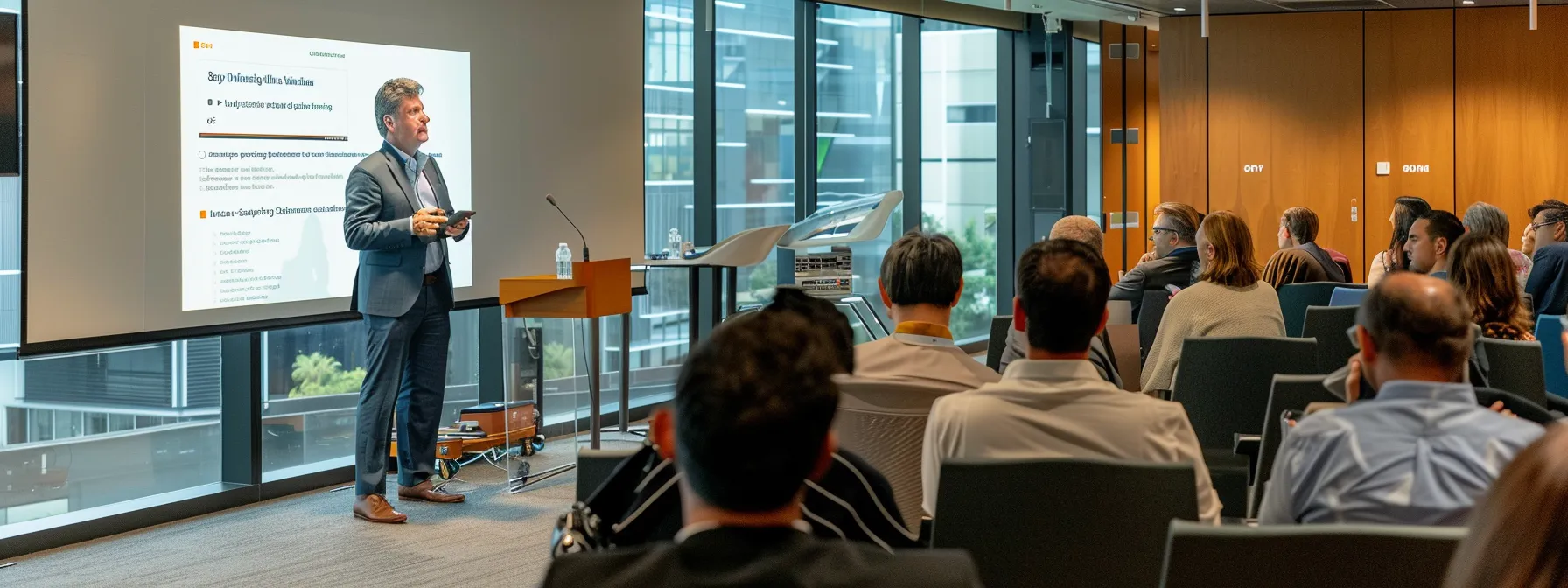Disclaimer: We sometimes use affiliate links in our content. For more information, visit our Disclaimer Page.
Effective leadership often hinges on strong public speaking skills. Did you know that over 70% of people experience anxiety when speaking in front of a crowd? This article will explore the connection between public speaking and leadership, how to overcome common fears, and the essential skills you need to develop. By improving your ability to communicate, you will become a thought leader in your organization, fostering meaningful conversations and motivating your team. Tackle your public speaking challenges and enhance your rhetoric to lead with confidence and clarity.
Understanding the Connection Between Public Speaking and Leadership

Strong communication is essential in leadership, impacting team dynamics significantly. When you speak persuasively, you not only capture the attention of your audience but also influence decision-making processes. Transparent communication fosters trust, enhancing your credibility as a leader. This section will explore how effective public speaking skills promote active listening and understanding, all while building solid relationships within your crowd.
The Impact of Strong Communication on Team Dynamics
Effective communication plays a crucial role in leadership and impacts team dynamics significantly. When you express your ideas with confidence, you foster an environment of trust and respect, which encourages team members to engage sincerely. Leaders who model strong nonverbal communication, such as maintaining eye contact and using appropriate body language, enhance their message and facilitate better connections with their team.
Empathy is another vital component of strong communication in leadership. By actively listening and responding to your team’s concerns, you can encourage critical thinking and open dialogue. This approach not only builds solid relationships but also promotes a culture of collaboration, where team members feel valued and understood. Ultimately, enhancing your public speaking skills can dramatically improve the dynamics within your team, leading to higher productivity and morale.
How Persuasive Speaking Influences Decision-Making
Persuasive speaking serves as a powerful tool in decision-making processes, especially in leadership. When you present a speech that incorporates effective body language, you engage your audience more deeply, capturing their attention and fostering a receptive environment for your ideas. Training in public speaking can help you overcome fear and develop the confidence needed to express your thoughts clearly. As a result, your ability to influence others increases, allowing for informed decisions that align with the goals of your team or organization.
Your choice of words and delivery style can significantly impact the outcomes of discussions. For instance, when you articulate your message with clarity and passion, it enhances your credibility and persuades your listeners to consider your viewpoint. By understanding the nuances of persuasive speaking, you create a space where collaborative and effective decision-making thrives. This results in a more empowered team, ready to implement solutions that align with a shared vision for success.
Building Trust Through Transparent Communication
Building trust through transparent communication is a fundamental skill in effective leadership. When you openly share information and acknowledge both successes and challenges, you demonstrate courage and authenticity. This transparency encourages team members to express their ideas and concerns, fostering an environment of empowerment where everyone feels valued and included.
Your leadership experience can be significantly enhanced by prioritizing clear communication practices. For instance, regularly soliciting feedback and discussing team goals can reinforce trust among team members. This not only strengthens relationships but also positions you as a leader who is approachable and invested in the growth of others, a quality that resonates well in leadership experience examples for resume.
Public speaking is a bridge to leadership, but many hesitate to cross it. The next steps reveal how to confront and conquer those fears, making that bridge stronger.
Overcoming Common Fears of Public Speaking

Identifying personal barriers to effective communication is the first step in overcoming public speaking fears. You will explore techniques to manage anxiety before presentations, ensuring you approach each opportunity with confidence. Additionally, you will learn how to transform nervous energy into enthusiasm, helping you engage your audience more effectively. These strategies are essential for enhancing your public speaking skills and becoming a more effective leader.
Identifying Personal Barriers to Effective Communication
Identifying personal barriers to effective communication is crucial for developing your public speaking skills. Start by reflecting on your specific fears, such as the fear of judgment or making mistakes. Acknowledging these barriers allows you to address them directly, which is an important step toward becoming a more confident speaker.
Consider practical strategies to overcome these obstacles. For instance, practicing your speech multiple times in a friendly environment can help build your confidence. Additionally, seeking constructive feedback from peers offers valuable insights, allowing you to refine your message and delivery, ultimately enhancing your ability to engage your audience effectively.
Techniques to Manage Anxiety Before Presentations
To effectively manage anxiety before presentations, you can employ several techniques that are both practical and straightforward. Visualization is a powerful tool; take a moment to imagine yourself confidently delivering your speech and receiving a positive response from your audience. By picturing your success, you create a mental framework that can diminish feelings of fear and boost your confidence as a leader.
Breathing exercises can also play a vital role in calming your nerves. Before stepping on stage or entering the meeting room, take slow, deep breaths to help lower your heart rate and increase your focus. This simple technique not only reduces anxiety but also enhances your public speaking abilities by promoting clarity of thought, allowing you to engage your audience more effectively.
Turning Nervous Energy Into Enthusiasm
Transforming nervous energy into enthusiasm is a powerful strategy for enhancing your public speaking skills and becoming an effective leader. When you feel anxious, channel that energy into passion for your message. This shift not only makes your delivery more engaging but also resonates with your audience, helping you connect on a deeper level.
One practical technique to achieve this is by focusing on your content and how it can benefit your listeners. Instead of worrying about potential mistakes, emphasize the value of sharing your expertise. By prioritizing your audience’s needs, you will naturally convert any nervousness into excitement about the opportunity to inspire and inform, making you a more impactful leader in the process.
You have faced your fears. Now, it’s time to build the skills that will help you speak with clarity and confidence.
Developing Essential Public Speaking Skills

To enhance your public speaking skills for effective leadership, you must focus on crafting clear and concise messages. Utilizing non-verbal cues also plays a key role in reinforcing your points. Additionally, engaging your audience through storytelling can make your message more relatable and memorable. Each of these elements will significantly elevate your communication, strengthening your leadership presence.
Crafting Clear and Concise Messages
Crafting clear and concise messages is essential for effective public speaking and leadership. When you focus on simplicity in your communication, you ensure that your audience grasps your ideas without unnecessary confusion. Consider outlining your main points beforehand and sticking to a structured format that guides your listeners through your argument logically. This clarity helps establish your authority and makes your content more memorable.
To enhance your public speaking skills, prioritize the “one-idea-per-sentence” rule. By expressing each concept clearly and directly, you allow your audience to absorb your message more readily. Practice your delivery with this clarity in mind; do not hesitate to refine your words through rehearsals or feedback. This approach not only strengthens your connections with your audience but also supports your leadership effectiveness by conveying your thoughts with authority and trustworthiness.
Utilizing Non-Verbal Cues to Enhance Your Message
Non-verbal cues are a powerful component of public speaking that can significantly enhance your message. When you maintain eye contact, use appropriate facial expressions, and incorporate gestures, you reinforce your spoken words and create a more engaging experience for your audience. These cues not only convey confidence but also help establish a connection, making it easier for listeners to relate to your message.
Moreover, being mindful of your posture and movement can further amplify your effectiveness as a speaker. Standing tall and moving purposefully can demonstrate authority and commitment to your message. By aligning your non-verbal communication with your spoken content, you create a cohesive presentation that resonates with your audience, fostering a deeper understanding and encouraging engagement in the leadership context.
Engaging Your Audience With Storytelling
Engaging your audience through storytelling can significantly enhance your public speaking skills, making your message more impactful. When you share a relevant story, you create a connection that allows your audience to relate to your experiences or ideas. This not only keeps their attention but also fosters a deeper understanding of your key points, making your overall presentation more memorable and effective.
Moreover, utilizing storytelling can make complex information more accessible. By framing your message within a narrative, you can simplify concepts and provide context that resonates with your audience’s emotions. This approach helps you address their needs and concerns directly, empowering you to inspire and motivate your listeners toward action or reflection, thereby strengthening your leadership presence.
You’ve learned the basics of speaking well. Now, it’s time to put those skills to the test in real work situations, where every word matters.
Practicing Public Speaking in Professional Settings

Opportunities for speaking within your organization can significantly enhance your public speaking skills and leadership presence. Actively seeking feedback will help you identify areas for improvement in your communication abilities. Additionally, joining public speaking groups offers valuable practice and support. Each of these avenues provides practical insights to help you grow as a confident and effective leader.
Opportunities for Speaking Within Your Organization
Within your organization, actively seeking opportunities to speak, such as team meetings or project presentations, can greatly enhance your public speaking skills. By volunteering to lead discussions or report on project progress, you not only practice but also build your confidence in a supportive environment. This allows you to refine your message and delivery style while receiving immediate feedback from your peers, which is essential for growth as a leader.
Additionally, participating in lunch-and-learn sessions or workshops gives you the chance to share your expertise and insights with colleagues. This environment encourages open dialogue and fosters a culture of learning, directly benefiting your public speaking abilities. Engaging with your audience in these informal settings helps you understand their perspectives, enabling you to connect with them more effectively and become a more influential leader.
Seeking Feedback to Improve Communication Skills
Seeking feedback is a crucial step in improving your communication skills. After delivering a presentation, ask colleagues or mentors for their insights on your clarity, engagement, and delivery style. This constructive criticism can highlight areas for growth and help you refine your public speaking techniques, making your future presentations more effective and impactful as a leader.
Incorporating feedback into your practice not only boosts your confidence but also demonstrates your commitment to growth. For instance, if a colleague points out that you tend to speak too quickly, you can work on pacing yourself in subsequent presentations. By actively engaging with feedback, you enhance your public speaking skills and establish yourself as a leader who values continuous improvement and open communication.
The Benefits of Joining Public Speaking Groups
Joining public speaking groups offers you a platform to practice your communication skills in a supportive environment. These groups often provide structured feedback on your presentations, allowing you to identify strengths and areas for improvement. This immediate insight can boost your confidence and enhance your public speaking skills, essential for effective leadership.
Additionally, participating in these groups connects you with others who share similar goals, creating a network of support and encouragement. Engaging in regular practice sessions can help reduce anxiety, allowing you to refine your message and delivery style. By working alongside peers, you will not only develop your skills but also gain valuable perspectives that can enhance your leadership capabilities and enrich your team’s dynamic.
You’ve conquered your nerves and stood before an audience. Now, understanding how to adapt your style to different listeners will make your message resonate even deeper.
Adapting Communication Styles for Different Audiences

Understanding the needs of various stakeholders is essential for effective public speaking. Tailoring your message for maximum impact means considering your audience’s preferences and expectations. Additionally, cultural sensitivity is crucial in global leadership communication, as it fosters respect and understanding. This section will provide practical insights into these topics, enhancing your ability to connect with diverse groups.
Understanding the Needs of Various Stakeholders
Understanding the needs of various stakeholders is crucial for effective public speaking and leadership. Each audience has unique expectations, and recognizing these differences allows you to tailor your message accordingly. For instance, when addressing a technical team, using industry jargon can demonstrate your competence, while a more general audience may require simpler explanations to grasp complex concepts.
Moreover, listening to your audience’s feedback and observing their reactions during your presentation will help you adjust your approach in real time. This adaptability fosters engagement and ensures that your message resonates with everyone present. By prioritizing the interests and concerns of your stakeholders, you enhance your credibility and the overall impact of your public speaking efforts, paving the way for successful leadership interactions.
Tailoring Your Message for Maximum Impact
To tailor your message for maximum impact, start by assessing the specific needs and interests of your audience. Understanding their perspectives allows you to adjust your language and examples accordingly, ensuring your message resonates. For instance, when speaking to a group of experts, incorporating industry-specific terminology can show your credibility, whereas using simpler language for a diverse audience helps convey your points more effectively.
Additionally, consider the context in which you are delivering your message. The setting and atmosphere play a significant role in how your content is received. Engaging your audience with relatable stories or relevant case studies can create a connection and enhance your leadership presence. By adjusting your communication style to fit your audience, you foster better understanding and increase the likelihood of a positive response.
Cultural Sensitivity in Global Leadership Communication
Cultural sensitivity is vital in global leadership communication, as it helps you connect with diverse audiences effectively. When you understand and respect different cultural norms, you can tailor your message to resonate with various groups. For example, maintaining a formal tone may be essential in some cultures, while others may appreciate a more casual approach. Recognizing these differences can enhance your credibility and foster trust among your audience.
Your ability to adapt your communication style shows respect for cultural values and enhances your public speaking skills. Consider incorporating culturally relevant examples or analogies in your presentations to make your points more relatable. This effort not only improves engagement but also demonstrates that you value your audience’s background, enabling you to develop stronger relationships and lead more effectively.
Effective communication shapes your message, but the journey doesn’t end there. Mastery in public speaking adds depth to your skills, opening doors to new opportunities.
Continuing Growth and Mastery of Public Speaking

To enhance your public speaking skills for effective leadership, focus on setting personal development goals that align with your communication objectives. Stay informed about emerging communication trends to maintain relevance and adapt your style accordingly. Moreover, inspire others through effective leadership communication that motivates and engages your audience. Each of these areas is essential for your continuous growth and mastery in public speaking.
Setting Personal Development Goals for Communication
Setting personal development goals for communication is essential to enhancing your public speaking skills for effective leadership. Start by identifying specific areas you want to improve, such as clarity in your messages or your ability to engage your audience. For instance, if you notice that you struggle with nervousness during presentations, aim to practice your delivery in front of a trusted colleague or record yourself to assess your performance and build confidence.
Create measurable goals that reflect your progress and encourage personal growth. For example, commit to delivering a certain number of presentations within a set timeframe and seek constructive feedback each time. By establishing clear objectives focused on improving your public speaking abilities, you position yourself as an adaptable leader who prioritizes effective communication, ultimately strengthening your influence within your organization.
Keeping Up With Emerging Communication Trends
To enhance your public speaking skills, staying updated on emerging communication trends is crucial. You might consider following industry thought leaders on social media or subscribing to relevant newsletters to discover new techniques and styles. Engaging with the latest trends can offer fresh perspectives and help you adapt your speaking style to meet contemporary audience expectations.
Participating in workshops or webinars focused on modern communication strategies can also be beneficial. These interactive sessions provide opportunities to learn best practices and receive instant feedback on your speaking methods. By actively seeking out these resources, you not only improve your public speaking abilities but also position yourself as a forward-thinking leader who values continuous growth and effective communication.
Inspiring Others Through Effective Leadership Communication
Inspiring others through effective leadership communication involves clearly articulating your vision and fostering a sense of purpose among your team. When you share your goals passionately, you motivate your audience to align with those objectives, creating a shared commitment to success. By incorporating personal stories or experiences into your communication, you enhance relatability, making your message more engaging and impactful for those you lead.
Your ability to listen actively and respond to feedback further strengthens your influence as a leader. By demonstrating that you value your team’s input, you cultivate an environment where individuals feel empowered to contribute their ideas. This open dialogue not only boosts morale but also encourages collaboration, ultimately driving your organization toward its goals while enhancing your public speaking proficiency.
Conclusion
Enhancing public speaking skills is essential for effective leadership, as strong communication fosters trust and collaboration within teams. By mastering persuasive speaking, you can influence decision-making and create a positive impact on your organization. Adapting your message for diverse audiences and embracing feedback accelerates personal growth and strengthens your leadership presence. Ultimately, developing these skills empowers you to inspire others and lead with clarity and confidence.





